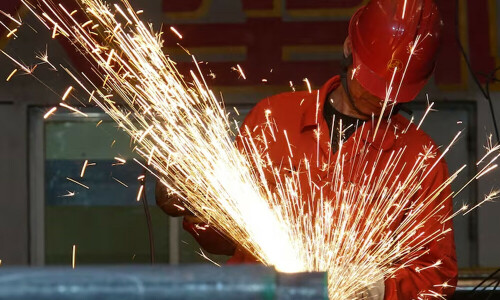China’s Industrial Profits Show Growth in Q1
Official figures released on Sunday indicate that China’s industrial profits have rebounded into growth during the first quarter. However, the ongoing trade tensions with the United States are expected to put further strain on these gains.
Economists and investors anticipate additional supportive measures from the Chinese government to mitigate the impact on the nation’s economy, especially with the U.S.’s imposing tariffs that threaten China’s vital export sector and the absence of a schedule for trade negotiations.
According to data from the National Bureau of Statistics (NBS), the cumulative profits of China’s industrial firms experienced a 0.8% increase, reaching 1.5 trillion yuan ($205.86 billion) in the first quarter compared to the previous year. This reverses the 0.3% decline observed in the initial two months of the year. Notably, profits in March alone saw a 2.6% year-on-year increase.
An official from the industry sector noted that China’s Q1 automobile exports increased by 16% year-over-year.
Yu Weining, a statistician at NBS, highlighted that the profit increase in the first quarter follows a 3.3% decrease in 2024. This shift breaks the pattern of continuous declines in cumulative profits for enterprises since the third quarter of the prior year. The data was released alongside a separate statement.
The statement also mentioned that profits in the wearable smart device manufacturing sector saw a substantial surge of 78.8%, while household kitchen appliance manufacturers experienced a 21.7% increase, attributed to a consumer goods trade-in initiative.
China’s economic growth in the first quarter surpassed expectations due to government stimulus measures that boosted consumption and supported investment. However, deflationary pressures continued to affect corporate profits and worker incomes as companies navigated increasing trade disruptions.
Yu stated that the external environment is becoming more complex and severe, with increasing unstable and uncertain factors. He further added that the government will enhance policy implementation to promote the ongoing improvement of corporate profitability.
Beijing has been urging exporters to seek local buyers as an alternative to the U.S. market, which has become effectively restricted due to increased tariffs on Chinese goods. However, many export-dependent factories have reported weak domestic demand, price competition, low profits, and payment delays within the Chinese market.
The Communist Party’s Politburo committed on Friday to support firms and workers significantly affected by the U.S. tariffs. They also indicated the establishment of new monetary tools and policy financing instruments to stimulate innovation, consumption, and foreign trade.
The NBS data indicates that profits at state-owned firms decreased by 1.4% in the first quarter, while private-sector companies experienced a 0.3% decrease. In contrast, foreign firms saw a 2.8% increase. These industrial profit figures encompass firms with annual revenue of at least 20 million yuan from their primary operations.



Comments (0)
No comments yet. Be the first to comment!
Leave a Comment